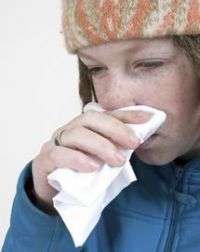Flu deaths could be reduced thanks to cancer research

(PhysOrg.com) -- Cells involved in the body’s immune response to cancer are also implicated in influenza infection and could be targeted in new flu vaccination strategies, scientists at Oxford University have discovered.
Many of the worst flu symptoms – such as fever, headaches, fatigue and death –result from tissue damage caused by inflammation, which is one of the body’s first lines of defence against infection by the flu virus.
Researchers at the MRC Human Immunology Unit at the University of Oxford have discovered a way of limiting this inflammation and increasing other immune responses that clear the infection faster and prevent secondary infections like pneumonia. The findings are published in the Journal of Clinical Investigation.
Clinical application of these new findings could enhance the natural immune response to flu and complement a vaccination strategy in the case of a pandemic by reducing flu symptoms and possibly deaths.
The new research shows that beneficial immune cells called ‘monocytes’, which may also cause inflammation and suppress normal immune responses in cancer patients, are also found in high numbers in blood samples from flu patients.
The research demonstrates, both in mice and humans, that activation of another type of immune cell – invariant NKT (iNKT) cells – with a prototype drug compound reduces the number of monocytes and cancels out their detrimental activity.
The expansion of iNKT cells in flu-infected mice has the effect of significantly decreasing the chance of the mouse dying from the infection and limiting the tissue damage caused by inflammation.
These iNKT cells are a key part of the immune system that adapts to new infections and are found in humans as well as in mice.
‘While development of an effective influenza vaccine to combat annual flu epidemics or a potential pandemic of avian flu is paramount, artificially activating iNKT cells could complement a generic vaccine,’ says Professor Vincenzo Cerundolo, Associate Director of the MRC Human Immunology Unit at the University of Oxford.
‘This finding could lead to an effective therapeutic treatment for acute influenza that can be prepared in advance of a pandemic and distributed quickly where it is needed most. We plan to start clinical trials in the next few years to test the safety and effectiveness of this approach.’
The researchers’ work focuses on understanding the body’s reaction to melanoma growth (cancer predominantly found in the skin). They are currently characterizing the proliferation and build-up of immature monocytes called Myeloid Derived Suppressor Cells (MDSC) in cancer patients. MDSCs are known to prevent the body activating targeted immune responses that would otherwise kill the cancerous cells and reduce the harmful inflammation.
Following studies on the role of MDSCs in moderating viral immune responses, they demonstrated that the presence of iNKT cells decreased both tissue inflammation and the death rate caused by flu infection.
Sir Leszek Borysiewicz, the Medical Research Council’s chief executive said: ‘Findings of this kind show the potential benefits brought by scientists working side-by-side across disease areas. Thanks to an MRC Experimental Medicine Award, work in early phase clinical trials on melanoma patients may lead to a life-saving complement to new flu vaccination strategies and so reduce the death toll of a potential pandemic.’
The research has been funded by the MRC and CRUK. Professor Vincenzo Cerundolo also receives support from The Ludwig Institute for Cancer Research.
Provided by Oxford University





















